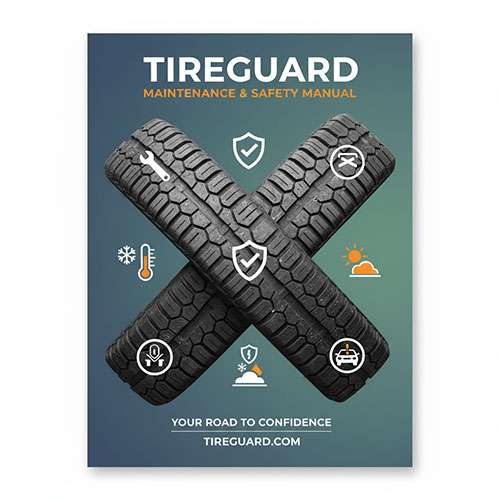
Car tire warranties represent serious money-saving opportunities that most drivers overlook when shopping for new tires. Understanding warranty coverage can protect you from paying full replacement costs when tire issues arise. Most tire manufacturers have established that tire life spans either six years from purchase date or until tread depth reaches 2/32nds of an inch. The actual warranty protection you receive varies dramatically between brands and coverage types.
Tire warranties typically run 3-5 years or cover 50,000-80,000 miles of driving. Manufacturers provide these protections to help consumers avoid full-price tire replacements when premature wear or defects occur. A standard tire warranty often includes a 60,000-mile tread life guarantee, ensuring your tires deliver promised mileage before wearing to unsafe levels. Manufacturer warranties also protect against material and workmanship defects for specific periods, frequently extending up to six years from your purchase date.
Knowing warranty duration and coverage terms becomes essential for smart tire buying decisions. We'll break down what determines warranty length, explore different protection types available, and show you how to secure full warranty benefits when purchasing your next set of tires.

Tire warranties serve as your financial safety net against manufacturing defects and premature tire failure. These manufacturer guarantees protect you from bearing full replacement costs when tire problems occur. Most tire companies provide warranty coverage lasting four to six years from purchase date or until complete tread wear, whichever comes first.
Tire warranties offer multiple layers of protection designed to address different failure scenarios:
Workmanship and Materials Warranty - Your primary defense against manufacturing flaws. This fundamental protection covers you for the tire's life or a specific 5-6 year period. When a blowout results from a manufacturing defect, this warranty provides your coverage.
Tread Life/Mileage Warranty - Also known as mileage warranty, this guarantee ensures your tires deliver promised miles before reaching 2/32" tread depth (legal minimum in most states). Premature tire wear typically results in prorated refunds based on unused mileage.
Road Hazard Warranty - Less frequently offered by manufacturers, this coverage shields you from pothole damage, nail punctures, glass cuts, and other road debris impacts. Some manufacturers include complimentary road hazard protection, though coverage usually applies only to specific models and covers the first 2/32" of treadwear or 12 months.
Uniformity Warranty - Addresses manufacturing inconsistencies affecting ride quality, protecting tires during the first 2/32" of wear or approximately the first year of use.
Road hazard protection plans frequently include additional benefits beyond tire replacement. Select plans reimburse rental car expenses while your vehicle receives service and may cover lodging and meal costs when tire damage disrupts travel plans.
Tire warranties appear similar on paper but offer dramatically different protection levels between manufacturers and retailers. Understanding these distinctions becomes crucial for your tire purchasing decisions.
Manufacturer warranties concentrate primarily on defects and premature wear, while retailer warranties often deliver more extensive protection. Some tire retailers extend road hazard coverage up to 24 months or until tire wear-out. Warehouse retailers like Costco provide extended five-year protection if tires haven't worn out.
Warranty terms include numerous exclusions that can void your coverage completely. Off-road use, racing, inadequate maintenance, accidents, and vehicle mechanical failures typically receive no coverage. Most warranties demand documented proof of proper maintenance, including regular rotations and inflation monitoring.
The value of tire warranties becomes clear when you consider that tires rank among your vehicle's most critical safety, performance, and comfort components. Since tires require replacement throughout your vehicle's lifetime, warranty protection substantially reduces long-term ownership costs.
Tire warranties function as insurance policies protecting your tire investment against defects and premature wear. Knowing exactly what your warranty covers—and its duration—prevents unexpected expenses when tire issues arise.

Tire warranty duration varies dramatically across manufacturers and retailers, making comparison shopping essential for maximum value. Understanding typical warranty lengths helps you select tires that deliver the best long-term protection for your investment.
Different warranty categories provide distinct protection periods:
Workmanship and materials warranties run 4-6 years from purchase date. These protect against manufacturing defects that cause premature tire failure. Nearly all tires include some form of manufacturer defect coverage.
Uniformity warranties address manufacturing inconsistencies affecting ride quality, covering only the first 2/32" of tread wear or roughly one year of use.
Road hazard warranties typically protect for the first 2/32" of treadwear, 12 months, or 12,000 miles – basically one year for average drivers. Falken stands out with hazard coverage extending to 3/32" of wear or two full years on select models.
Satisfaction guarantees offer 30-60 day trial periods. Michelin's Promise Plan includes a generous 60-day satisfaction guarantee.
Tire warranties work on dual limitations that run simultaneously:
Time-based limits create absolute expiration dates regardless of mileage driven. Most manufacturers establish 4, 5, or 6-year limits from purchase date. Your warranty ends when this time period expires, even if you haven't reached the mileage threshold.
Mileage-based coverage spans from 30,000 miles up to impressive 100,000-mile warranties on premium models. The National Highway Traffic Safety Administration recommends tire replacement after six years regardless of warranty status due to environmental degradation.
Time constraints significantly affect low-mileage drivers. A driver covering 5,000 miles annually with 5-year/40,000-mile warranty tires would lose coverage at 25,000 miles due to time expiration.
Major tire manufacturers offer varying protection levels:
Michelin leads with 6-year defect coverage and treadwear warranties from 30,000 to 100,000 miles depending on model. Their Defender2 and Defender T+H models feature 80,000-mile treadwear warranties.
Bridgestone provides 5-year defect warranties with treadwear coverage spanning 20,000 to 80,000 miles. The Turanza Everdrive includes an 80,000-mile limited mileage warranty.
Goodyear offers 6-year defect warranties and treadwear coverage from 30,000 to 85,000 miles. Their premium models carry 85,000-mile warranties.
Continental delivers 6-year defect warranties with treadwear coverage ranging 40,000 to 90,000 miles.
Pirelli supplies 5-year defect warranties and treadwear coverage from 30,000 to 90,000 miles.
Tire retailers frequently offer superior road hazard protection compared to manufacturers. Tire Rack and Tirebuyer extend coverage to 24 months or until tire wear-out. Costco provides five-year protection if tires haven't worn out, while BJ's covers tires for three years or 36,000 miles.
Read more about car tire warranties to understand specific terms and limitations that might apply to your purchase. Understanding these details can save you substantial money over your tires' lifespan.
Tire warranties come in several distinct types, each designed to protect you from different problems. Knowing what each warranty covers helps you choose the right tires and avoid surprises when filing claims.
Tread life warranties promise your tires will deliver specific mileage before wearing to 2/32" tread depth—the legal minimum in most states. Current warranties span from 30,000 miles up to an impressive 100,000 miles. When tires wear prematurely, manufacturers provide prorated refunds based on unused mileage.
Success with tread life claims requires proof of purchase and documented maintenance records, including regular tire rotations. All four tires must wear evenly to the wear bars before you can file a claim.
This essential coverage shields you from tire manufacturing problems that affect performance. Most manufacturers back their tires for 5-6 years from purchase date. During the first year or initial 25% of tread wear, defective tires get replaced at no charge. Beyond this period, replacement costs are calculated based on remaining tread depth.
Road hazard warranties protect against damage from potholes, nails, glass, and debris encountered during normal driving. While manufacturers rarely include this coverage, tire retailers frequently offer it as an upgrade.
Benefits typically include free flat repairs, tire replacements when repair isn't possible, and sometimes roadside assistance. Tire Rack provides two-year road hazard coverage with eligible purchases, protecting up to $599 per tire.
This specialized protection addresses manufacturing inconsistencies causing vibration or rough ride quality. Since uniformity problems appear immediately after installation, coverage applies only during the first 2/32" of wear or approximately the first year.
Manufacturers reject claims involving all four tires causing vibration, as this typically indicates vehicle issues rather than tire defects.
Many manufacturers now offer trial periods for testing tires without risk. Goodyear provides 60-day satisfaction guarantees, Nokian offers 30 days, and Michelin extends 60 days through their Promise Plan.
You can return undamaged tires during these periods if performance doesn't meet expectations. Tires damaged through misuse, road hazards, or racing aren't eligible for exchange.
Read more about car tire warranties to understand how long each type of warranty lasts for your specific tire brand and model.
Tire manufacturers enforce strict conditions that can destroy your warranty protection instantly. Even premium warranties become worthless when certain actions occur, leaving you stuck with full replacement costs when tire problems arise.
Poor maintenance destroys more tire warranties than any other factor. Manufacturers demand proper inflation levels and monthly pressure checks. Underinflated tires create uneven wear patterns that warranties don't cover. Running 20 psi when your vehicle needs 32 psi immediately disqualifies warranty claims.
Warranties require documented proof of regular tire rotations and proper alignment. Missing these records makes warranty collection nearly impossible. Your owner's manual shows rotation patterns and timing—usually every 5,000 miles. Professional rotations cost around $60, though many retailers include this service free with tire purchases.
Warranties exclude damage from specific activities:
Racing or competitive events
Extreme off-road driving
Burnouts, drifting, or tire modifications
Abuse or deliberate damage
Using tires beyond their design purpose automatically cancels coverage. Costco's road hazard warranty specifically excludes racing and off-road failures.
Installing different tire brands, tread patterns, or types voids warranties and damages vehicle systems. Mismatched tires create dangerous traction imbalances. All-wheel drive vehicles suffer the most—different tread depths can destroy expensive drivetrain components when the system fights perceived wheel slippage.
Keeping your tire warranty active requires following manufacturer guidelines precisely. These straightforward steps ensure you receive full warranty benefits when problems arise.
Your vehicle's maintenance schedule provides the roadmap for warranty compliance. Rotate tires every 5,000 to 8,000 miles according to your owner's manual. Schedule regular wheel alignment and balancing services - warranties typically require these procedures. Replace worn suspension components when needed, as manufacturers expect proper vehicle maintenance. Uneven tire wear from poor alignment can instantly disqualify warranty claims.
Service records become your warranty lifeline during claims processing. Save all receipts from tire rotations, alignments, and repair work. Most warranties demand proof of regular maintenance before approving claims. Create a maintenance log using a notebook or spreadsheet to track service history. Note the date, mileage, and specific work completed for each service.
Regular inspections protect your warranty status and driving safety. Check tire pressure at least monthly and before long trips. Look for irregular wear patterns that signal alignment or inflation issues. Address problems immediately - continuing to drive on damaged or improperly maintained tires voids most warranties.
Use your tires only for their intended applications. Operating tires beyond their design parameters will void warranty coverage. Store spare tires in cool, dry locations away from heat and sunlight. Following manufacturer guidelines protects both tire performance and warranty validity.
Tire warranties represent substantial financial protection that smart vehicle owners use to their advantage. We've covered the essential warranty types, duration factors, and protection strategies that separate informed buyers from those who pay full replacement costs unnecessarily.
Different warranty categories serve specific protection needs. Workmanship coverage guards against manufacturing defects, while tread life guarantees ensure you receive promised mileage performance. Road hazard and uniformity protections address specialized situations that affect many drivers during tire ownership.
Warranty terms differ significantly across manufacturers and retailers. Comparing protection becomes as crucial as evaluating tire performance when making purchase decisions. Premium manufacturers typically extend longer coverage periods, while many retailers offer superior road hazard protection compared to manufacturer warranties.
Maintaining warranty validity requires consistent attention to proper care practices. Regular maintenance, documented service records, correct inflation, and appropriate usage preserve your coverage when you need it most. Even excellent warranty terms become worthless without proper maintenance documentation.
Tire warranties function as insurance against premature failure and unexpected replacement costs. The knowledge you've gained here empowers you to make informed tire purchases and secure maximum warranty value. This protection helps you avoid surprise expenses while getting the best return on your tire investment.
Understanding tire warranty duration and terms can save you hundreds of dollars in unexpected tire replacement costs and ensure you get maximum value from your purchase.
• Most tire warranties last 3-5 years or 50,000-80,000 miles, with premium brands offering up to 100,000-mile coverage
• Five warranty types protect different issues: tread life, workmanship defects, road hazards, uniformity problems, and satisfaction guarantees
• Proper maintenance records are essential - keep receipts for rotations, alignments, and pressure checks to validate warranty claims
• Common warranty voids include improper inflation, missing rotation records, off-road use, and using mismatched tires
• Retailer warranties often provide better road hazard protection than manufacturer warranties, extending coverage up to 24 months
Remember that warranties operate on both time and mileage limits - whichever comes first determines when your coverage expires. Even if you haven't reached the mileage threshold, most warranties end after 4-6 years regardless of actual tire wear.
Most tire warranties last between 3-5 years or provide coverage for 50,000-80,000 miles. However, premium models from some manufacturers can offer protection for up to 100,000 miles.
Tire warranties typically include several types of coverage: tread life/mileage warranty, workmanship and materials warranty, road hazard warranty, uniformity warranty, and satisfaction guarantee or trial period.
Common reasons for voiding a tire warranty include improper maintenance or inflation, lack of rotation or alignment records, off-road or racing use, and using mismatched tires.
Most manufacturer warranties don't cover damage from road hazards like nails. However, some tire retailers offer separate road hazard protection plans that may cover punctures and similar damage for a limited time or tread wear.
To maintain your tire warranty's validity, follow the manufacturer's maintenance schedule, keep detailed service records, inspect your tires regularly, and use the tires only for their intended purpose.